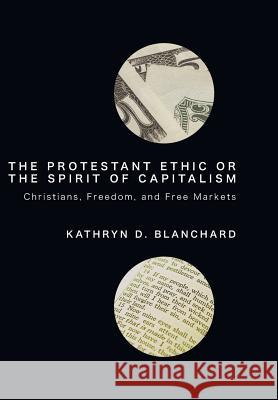The Protestant Ethic or the Spirit of Capitalism » książka
The Protestant Ethic or the Spirit of Capitalism
ISBN-13: 9781498211819 / Angielski / Twarda / 2010 / 262 str.
The Protestant Ethic or the Spirit of Capitalism
ISBN-13: 9781498211819 / Angielski / Twarda / 2010 / 262 str.
(netto: 182,07 VAT: 5%)
Najniższa cena z 30 dni: 191,17
ok. 16-18 dni roboczych.
Darmowa dostawa!
Description: Since the publication of Max Weber's classic, The Protestant Ethic and the Spirit of Capitalism, it has long been assumed that a distinctly Protestant ethos has shaped the current global economic order. Against this common consensus, Kathryn D. Blanchard argues that the theological thought of John Calvin and the Protestant movement as a whole has much to say that challenges the current incarnation of the capitalist order. This book develops an approach to Christian economic ethics that celebrates God's gift of human freedom, while at the same time acknowledging necessary, and indeed vital, limitations in the context of material and social life. Through sustained interaction with such unlikely dialogue partners as Adam Smith, Milton Friedman, Deirdre McCloskey, and Muhammad Yunus, this book shows that the virtues of self-denial, neighbor love, and sympathy have been quite at home in the capitalism of the past, and can be again. Though self-interest has enjoyed several decades as the unquestioned ruling principle of American economics, other-interest is steadily coming back into view, not only among Christian ethicists, but among economists as well. This book explores the important implications of this shift in economic thinking from a theological perspective. Endorsements: "Christian ethicists, confronted by the complexities of modern economic science, have largely abandoned any attempt to assess the moral presumptions of economics--but not Kate Blanchard. Instead, she has done the hard work of probing the Chicago School of economics in an effort to expose their inadequate understanding of freedom. Blanchard even helps us to see how capitalism--or better, the market rightly conceived--both depends upon and can enhance our trust of one another." --Stanley Hauerwas Gilbert T. Rowe Professor of Theological Ethics Duke Divinity School "Kathryn Blanchard's book is a thought provoking and gracefully written exploration of what Christian freedom means in economic life. She wrestles with the thought of John Calvin, Adam Smith, and the Chicago School, taking economics seriously, but not so seriously as to silence her theological voice. Well informed and fair-minded, it is a personal book, with an admirable self awareness and awareness of the context of the authors she discusses. Choose it over many of the turgid and predictable volumes that line the Christian social ethics shelves." --Paul Oslington Professor of Economics Australian Catholic University "In this wonderful book, Kathryn Blanchard issues a winsome invitation to a more humane capitalism and a serious call to narrate and to practice capitalism in a morally and socially responsible way. By her engaging and sympathetic accounts of John Calvin and Adam Smith, by her theologically astute criticisms of the 'the Chicago School, ' and by her attention to new voices in economics, she points Christians beyond the options of simply tithing or simply uttering prophetic jeremiads against capitalism. She points all of us toward a more virtuous economic life. --Allen Verhey Professor of Theological Ethics Duke Divinity School "The Protestant Ethic and the Spirit of Capitalism is an impressive work of Christian ethics that integrates theological and economic analyses into a challenging and important discussion about freedom and markets. Those who are profoundly suspicious of free market capitalism, those who enthusiastically celebrate free market capitalism, and the confused majority of us who fall somewhere in between will all learn a great deal, think more, and be better equipped to talk to one another because of Kathryn Blanchard's fine work." --Kevin J. O'Brien Assistant Professor of Religion Pacific Lutheran University "In the midst of a global economic crisis, Blanchard's careful analysis of the meaning and function of 'freedom' in the works of John Calvin, Adam Smith, and the Chicago School of Economics brings clarity and insight to the ethical underpinnings of a











